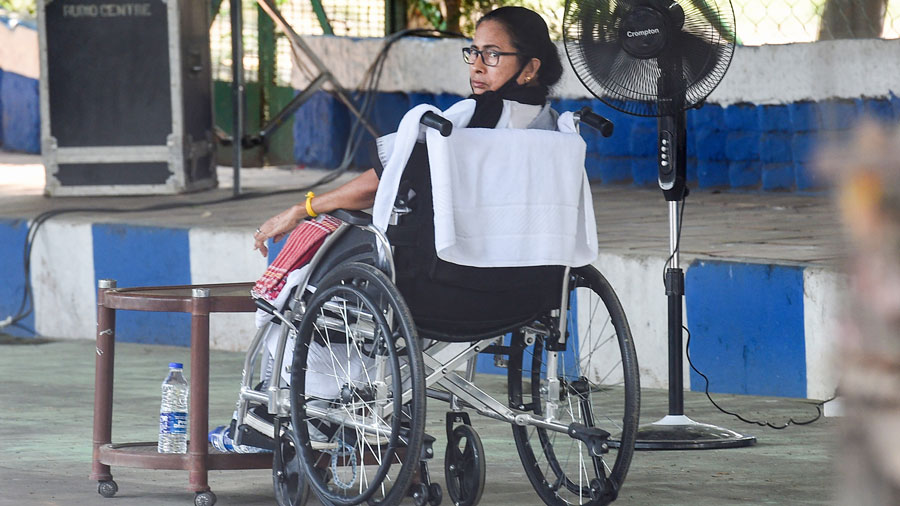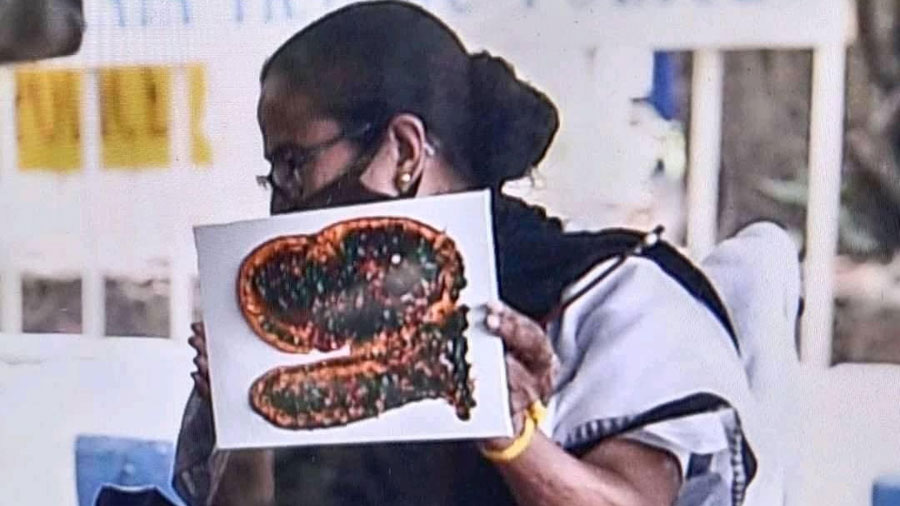Chief minister Mamata Banerjee sat on a dharna on Tuesday all by herself near Gandhi’s statue on Mayo Road, her favourite protest spot during her days in the Opposition, to protest against the Election Commission of India’s (ECI) decision to ban her from campaigning for 24 hours.
Wearing a black mask and scarf, Mamata arrived on a wheelchair with her painting tools a little before 12 noon. She stayed on till around 3pm, it was unclear why she left.
In the little over three hours that Mamata was at the dharna site, she kept herself occupied by painting. None of the other senior Trinamul leaders who are usually there whenever she is on a dharna was around. With the EC clamping her speech, Mamata kept her thoughts to herself, though she was seen making one call after the other.
Her security team too was kept at a short distance away from her, while she was on the wheelchair, with two small tables where she kept brushes and paint and paper. Once she was done, Mamata displayed some of the paintings to the photographers present.
Trinamul sources said Mamata was scheduled to resume her campaign at night at Barasat and Salt Lake. But she would have to wind up before 10pm, the deadline for campaigning to end for the fifth phase of voting to be held on April 17.
On Wednesday, Mamata is scheduled to go to Mathabhanga in Cooch Behar to meet the three injured victims of Sitalkuchi’s firing.
Tuesday’s dharna is an extension of the running feud between Mamata and the Election Commission of India (ECI) in the run up to the Bengal polls. The feud got aggravated after the ECI banned entry of all politicians in Cooch Behar’s Sitalkuchi where four villagers fell to bullets of central forces on voting day April 10.

Bengal Chief Minister Mamata Banerjee, sitting on a wheel-chair, stages a protest in front of the Gandhi Statue in Calcutta on Tuesday. PTI
The ban against Mamata to campaign came into effect from Monday 8.00pm and is to continue till Tuesday 8.00pm. The ECI took cognisance of Mamata’s April 3 speech, primarily her comment that she would not allow minority votes be divided, something it concluded violated the model code of conduct.
Like Ajay Mukherjee, the former chief minister who had staged a dharna against the government he led during the tumultuous days of the United Front in the late ’60s, Mamata’s has often betrayed her streetfighter tendencies, particularly in her second term when her spats with the Centre escalated.
On the night of December 2, 2016, Mamata refused to leave the state administrative headquarters, Nabanna, objecting to the presence of the Army at the national highway toll booths and questioned whether it was a “coup”. She relented only after the Army officers and personnel left the toll booths.
Little over two years later on a February evening, Mamata occupied the Metro channel for three days to protest the summons against then city police chief Rajeev Kumar in the Saradha scam.
ECI axe on BJP leader
On Tuesday, the election commission announced a 48-hour ban on BJP leader Rahul Sinha for making provocative statements, while two of his party colleagues Suvendu Adhikary and Dilip Ghosh, were slapped with warnings.
After the Sitalkuchi incident, Sinha had commented that the central forces should have killed eight persons instead of four, while Ghosh threatened a repeat of Sitalkuchi in the constituencies where polling is yet to be held.
Addressing an election campaign meeting in Berhampore, Ghosh, who is also the chief of BJP’s Bengal unit, demanded the resignation of Mamata and that she be barred from campaigning for the remaining duration of the polls.
“Despite being the chief minister she is making provocative statements. Banning her for 24 hours is not enough. She should be disbarred from campaigning,” Ghosh said. “Be it the Supreme Court or the Election Commission, instead of following rules, she prefers to hit the streets.”
The central poll panel has been under fire from Opposition parties for allegedly toeing the BJP’s line and working to its advantage. In neighbouring Assam where the poll process ended on April 6, the state chief minister Himanta Biswa Sarma’s campaign ban was reduced from 48 hours to 24 hours after he apologised for allegedly threatening Bodoland People’s Front leader Hagrama Mohilary.











